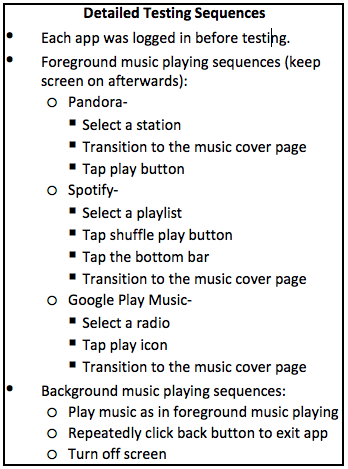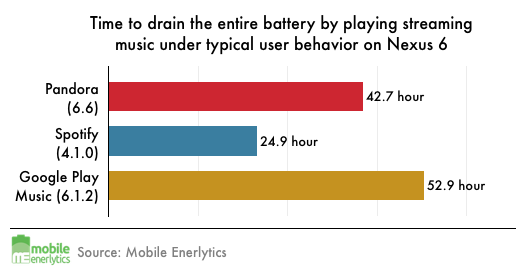Since Pandora first launched music streaming 15 years ago, the music streaming category of mobile apps has become crowded with over a dozen popular alternatives today, many of which are undergoing rapid revisions. For example, Spotify releases a new version of its mobile app every two weeks. As a result, deciding on which music service to choose has become often difficult. In fact, a simple Google search for “Pandora vs. Spotify” today churns out over 4 million search results, which attempted direct comparisons of leading music streaming services along a multitude of dimensions, such as song selections, features, user experience, and business model.
Since battery drain is an important factor that affects user experience, we carried out a head-to-head comparison of the battery drain rate of 3 leading streaming music apps.
To isolate the impact of other apps running on the devices, we tested the battery draining rate of the recent versions of Pandora, Spotify and Google Play Music in the lab.

Our methodology for the test consists of three steps. In step 1, we measured the battery life in playing music in foreground and background, respectively. We uninstalled all the other third party apps from a Nexus 6 phone so that no other background task was running. We then put each of the three music apps in the streaming music mode to play music from a pre-selected music categories, under WiFi (see sidebar for details). We measured how long it takes to drain the entire battery for each app. The results are shown in the following graphs.


In Step 2, we measured how much time real users spend playing music in foreground and in the background using their smartphones. The analytics from Eagle of 15,000 Android users who has installed at least one of the three music apps above shows that 83% of the total music app usage is spent on playing music in the background. On average, users spend 10 minutes playing music in foreground and 49 minutes playing music in background per day.
Finally in Step 3, we calculated the expected battery life in playing music under typical user behavior, as the weighted average battery life of the above measured battery life when playing music in foreground and in background, weighted by the percentage foreground (17%) and background (83%) playing time measured on the 15,000 Android phones.

The results, shown above, show that Google Play Music drains over 2X less battery compared to Spotify, and Pandora drains 70% less battery than Spotify. In other words, for a music fan who spends a lot of time playing music on her smartphone, switching from Spotify to Google Play Music can extend the battery life and hence listening time by 2X!
We plan to benchmark the battery performance of other streaming music apps and we also welcome streaming music app vendors to repeat these experiments on different handsets following the above simple methodology.
One thought on “Music Lovers: Switch Streaming Music Apps and Extend Your Battery Life by 2X”
Comments are closed.
Its good to know that certain music streaming services use more battery than others. My son was asking why his battery drains so fast after he switched his music streaming service. I’ll let him know that certain music streaming apps use more battery life compared to others.